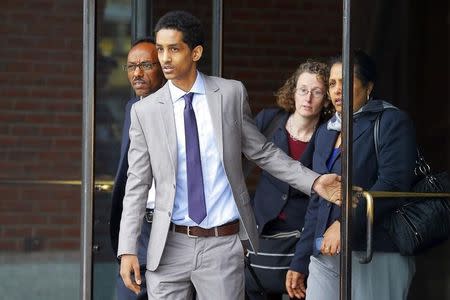Judge refuses to move trial of accused Boston bomber's friend

By Scott Malone BOSTON (Reuters) - A U.S. judge denied a renewed plea by a friend of the accused Boston Marathon bomber to move his trial on charges of lying to investigators outside the city that was the site of the largest mass-casualty attack on U.S. soil since Sept. 11, 2001. The defendant, Robel Phillipos, accompanied two Kazakh exchange students to accused bomber Dzhokhar Tsarnaev's college dorm room three days after the April 15, 2013, bombing, where they removed a laptop computer and a backpack containing empty fireworks shells, according to federal prosecutors. One of the other two men, Azamat Tazhayakov, was found guilty in July of obstruction of justice for the visit, and the second, Dias Kadyrbayev, in August pleaded guilty to the same charge. U.S. District Judge Douglas Woodlock said that the court experienced less trouble selecting a jury for the Tazhayakov trial than had been anticipated. "I'm satisfied as to being able to get a fair and impartial jury in this case," Woodlock said. Noting that he had once before rejected a bid to move the trial, he chastised defense lawyers for renewing their request in a court filing on Monday. "There was nothing new as of Sept. 22," Woodlock said. Phillipos, 20, who did not attend Tuesday's hearing, is charged with lying to investigators, and could face a sentence of up to 16 years in prison if convicted. Prosecutors do not contend that Phillipos, who has been largely confined to his Cambridge, Massachusetts, home since his May 2013 arrest, played any role in the attack, which killed three people and injured more than 260. Woodlock said jury selection would begin on Monday, with opening statements a week later, on Oct. 6. Tsarnaev is awaiting a trial set to begin in November. He faces the possibility of execution if found guilty of carrying out the deadly bombing and also murdering a university police officer three days later. (Reporting by Scott Malone; Editing by Grant McCool and Leslie Adler)

